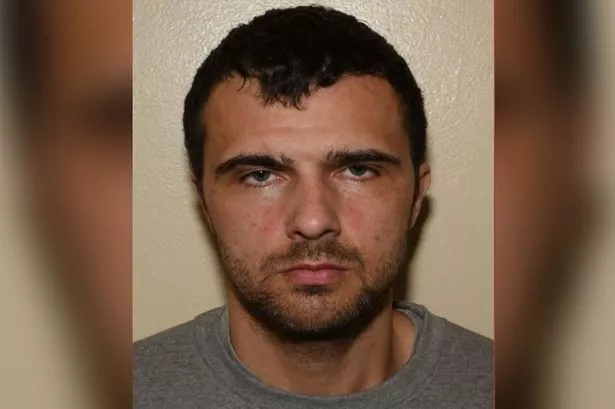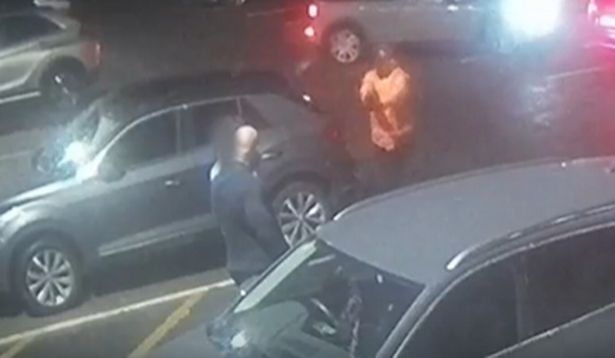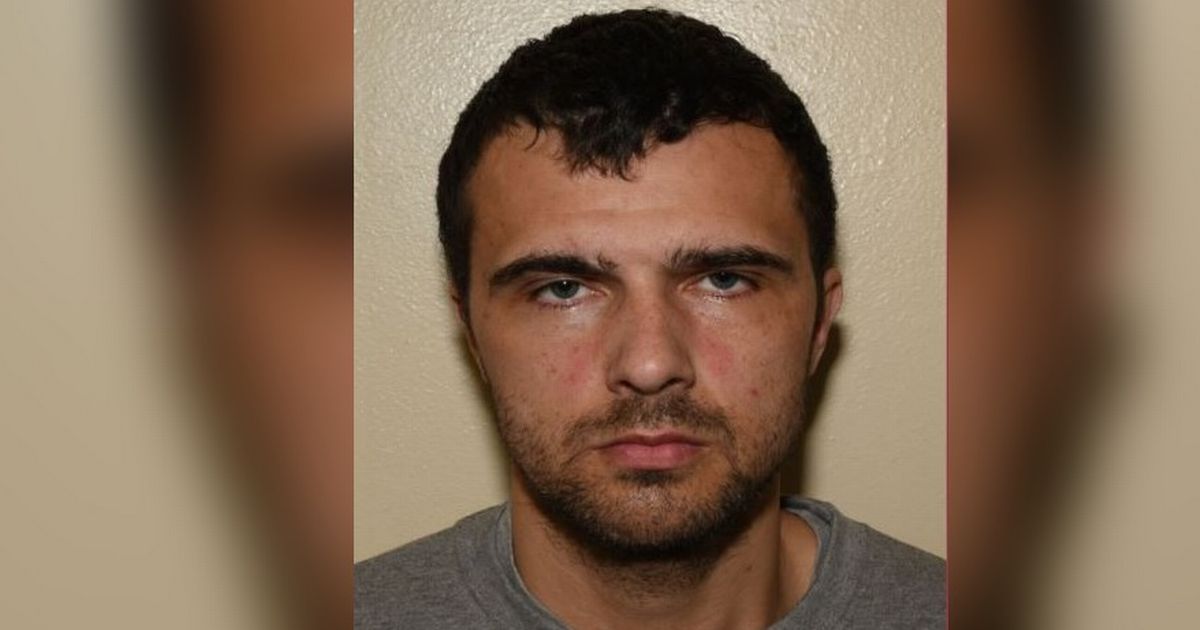Elias Morgan shot former police officer Lenny Scott six times in a “revenge attack” in February last year Elias Morgan found guilty of the murder of Lenny Scott(Image: Lancashire Police)
Elias Morgan found guilty of the murder of Lenny Scott(Image: Lancashire Police)
Elias Morgan was today jailed for life with a minimum term of 45 years for the murder of former prison officer Lenny Scott. Morgan, 35 and of Edge Hill, shot dad-of-three Mr Scott six times outside a gym in a “revenge attack” on Peel Road in Skelmersdale on February 8 last year.
Gunman Morgan, who wore a mask and an orange hi-vis jacket during the ambush attack, pulled the trigger in an “act of retaliation” nearly four years after ex-HMP Altcourse guard Mr Scott, 33, exposed an illicit relationship between the then serving prisoner and a female prison officer.
Mr Scott, of Prescot, was said to have refused a bribe of £1,500 in return for not reporting a phone which Morgan illegally held behind bars and contained evidence of the affair. Morgan, of Highgate Street, later warned Mr Scott “I’ll bide my time, but I promise I will get you”, before making a gun gesture towards him.
Morgan was unanimously convicted of Mr Scott’s murder by an 11-person jury at Preston Crown Court last week, Friday. He returned to the same court to be sentenced by high court judge Mr Justice Goose today, Tuesday, September 2
Morgan, who appeared in the dock sporting dark hair and wearing glasses and a fleece, did not react as he was told he would spend at least the next 45 years behind bars, minus what he has already served on remand.
 Lenny Scott was fatally injured when he was shot on February 8 2024 (Image: Lancashire Constabulary)
Lenny Scott was fatally injured when he was shot on February 8 2024 (Image: Lancashire Constabulary)
Sentencing, High Court judge Mr Justice Goose branded the attack ‘a carefully planned revenge killing of a prison officer’. This is every word he said to Morgan as he was locked up until the age of at least 80.
“On the 26th March 2020 Lenny Scott was a Prison Officer in Altcourse Prison, Liverpool while you, Elias Morgan, were serving a prison sentence. In the course of his duties Lenny Scott seized a mobile phone from you, which it was illegal for you to possess and lawful for him to confiscate. Upon that phone there was evidence of further offending by you.
“Subsequently, you offered him money to dispose of the phone, which he refused, and then you threatened him. In chilling words of what was to follow, you threatened to kill him; you said “I will bide my time” and you motioned with your hand a firearm.
“Almost four years later, on the 8th February 2024 and after careful planning, you waited for Lenny Scott outside Peel House in Skelmersdale. At 7.35 that evening you walked up to him and you shot him with a handgun.
“You fired six shots at close range, all of which hit him. He died at the scene as you escaped. The shooting was captured on CCTV, which this court has observed during the trial. Whilst others may have assisted you, I am sure that you were the shooter.
“Elias Morgan, I am sure that this murder was because the deceased was a prison officer, carrying out his duty in 2020 when he lawfully seized your mobile phone. Whilst he was no longer a serving prison officer when you murdered him, he was when you decided that you would bide your time before doing so.
“I am also sure that in your mind was revenge. You have been used to getting your own way by threats and violence, evidence of which was heard by the jury, so that when the deceased would not do what you wanted, he was to be punished by you.
“Why did it take almost four years? It was because you had told the deceased you would take your time. Also, you were about to face a trial arising from the evidence revealed by that mobile phone.
“This murder was, in my judgment, a carefully planned revenge killing of a prison officer. It was carried out when you were at liberty and the deceased was no longer a serving prison officer. Those facts, of which I am sure, raise this murder to a very high degree of particular seriousness.
“The preparation before and after the murder reveal the extent of the careful planning by you. It included the discovery of the movements of the deceased, where he lived with his partner and very young children, and which gym he used in Skelmersdale; driving to those places during January, the month before the shooting.
“Also, obtaining an electric motor bike and arranging for another person to transport the motor bike inside a van, both of which were taken on a low loader vehicle to Daybrook in Skelmersdale the night before the shooting.
“Using another vehicle, a Mercedes GLC, to drive to Skelmersdale from Liverpool and arriving about an hour before the shooting, but parking that vehicle a short distance away to avoid suspicion. The electric motor bike was used to travel quietly to and from the scene in a rehearsal of the route for the shooting.
“The wearing of a hi-vis orange jacket so that after the shooting it could be removed and make it harder to identify you as the shooter. Returning to the van, putting the motorbike inside and using false registration plates, before disposing of evidence of the van, the bike and the gun, which have never been recovered.
 Gunman approaches Lenny Scott outside the gym before shooting him(Image: Lancashire Police)
Gunman approaches Lenny Scott outside the gym before shooting him(Image: Lancashire Police)
“In the aftermath of the murder, the Mercedes was moved to a different place after changing its registration plates. You repeated that twice more, in an effort to disguise the vehicle which had been used to drive to Skelmersdale to carry out the shooting. You even went to the extent of removing the SOS unit from that vehicle, because you feared its manufacturer’s SIM card might provide data of the vehicle’s movement.
“Fortunately, you didn’t know that there was another manufacturer’s SIM card which provided telematics data which the police needed. When you were arrested you made no comment during each of your police interviews.
“The murder of the deceased has caused profound grief to the deceased’s family, his young children and to all who knew him. He was 33 years old with much of his life ahead of him. He was loved, respected and made his family proud. The attempts by you during the trial to blacken his character have been rejected by the Jury.
“In the victim personal statements this court has heard the very moving statements from his mother Paula Scott, his father Neil Scott and his former partners Lucy Carnhill and Lucy Griffiths, who must bear their suffering for the rest of their lives.
“I turn to the features which aggravate seriousness. In addition to the very significant degree of planning, is that this was a revenge killing of the deceased for what he did lawfully as part of his duty as a serving prison officer.
“There is an important public interest, in making the killing of prison and police officers in the course of their duty, exceptionally serious. This is expressly reflected within schedule 21 of the Sentencing Act 2020. Whilst the deceased was not acting in the course of his duty when he was murdered, because he was no longer a prison officer, the killing was carried out because of what he lawfully did when he was acting in the course of his duty.
“It was revenge, threatened by you when the deceased was a prison officer. The public interest in making the murder of former prison and police officers for their lawful actions whilst serving officers, must require in my judgment sentencing on the basis that it is of particular seriousness, to a very high degree.
“Whilst the prosecution have argued that this offence must be treated as exceptionally serious because it should fall within paragraph 2(2)(c) of schedule 21, I am not persuaded that is correct. There is an obvious difference in seriousness between the murder of a prison or police officer whilst in the course of their duty and one which is not.
“Further, it is not without significance that the identification of the fact of the murder being in the course of duty, was important prior to the amendment to schedule 21 in 2015, when it became included in the highest level of seriousness.
“It reflects the greater seriousness of being a murder whilst the officer was performing their duty. Nor do I find that the overall circumstances of this murder leads me to treat this case as one requiring a whole life term, rather than of a very high degree of particular seriousness with a 30 years minimum term starting point and a substantial increase in that term.
“I have come to the conclusion that as serious as this murder was, it does not require the imposition of a whole life term.
“Elias Morgan, you are aged 35. You have previous convictions for offences of theft, burglary, conspiracy to rob, drugs and causing serious injury by dangerous driving between 2005 – 2016. I do not find in the circumstances of this offence that your previous convictions significantly affect its seriousness.
“I have not found there to be any significant mitigating factors which might reduce the seriousness of this offence. None have been advanced by Miss Goodwin KC, whom you have instructed to make no submissions on your behalf.
“The sentence that I am required to impose on you for this offence of murder is imprisonment for life. I am also required to fix the minimum term which you must serve before you might apply for release on licence by the parole board, which alone will determine when that may happen. Upon your release you will remain on licence for the rest of your life and be subject to recall to custody if you breach the terms of your licence.
“The starting point for your minimum term must be one of 30 years, because you committed this murder with a firearm. As I have already explained, the factors which make this offence more serious mean that I must increase that minimum term substantially.
“Had you committed this offence whilst the deceased was still a serving prison officer, I would have made you the subject of a whole life order. The fact that the deceased was not still a serving prison officer has caused me to step back, but the minimum term must be very substantial, which I determine to be 45 years, less 452 days being the time which you have served on remand in custody.
“Accordingly, for this offence of murder, I sentence you to imprisonment for life with a minimum term of 43 years and 278 days.
“You will also pay the statutory charge in the appropriate amount, which will be entered on the court record.”

